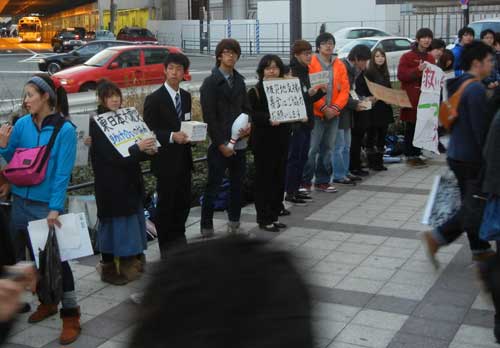The following is a blog post from one of our University of Lethbridge students currently studying in Japan. Kelsey Thibodeau, a Taber, Alta. native, is a fourth-year Management student on an international exchange.
I'm studying at Kansai Gaidai University in Hirakata, which is located in the Osaka Prefecture. Hirakata is located more than 600 km from Sendai in the Miyagi prefecture where the earthquake and tsunami hit hard, just to give readers an idea of how far I am located from the main point of destruction.
This is the second earthquake that I have felt since I arrived in February and I must say that this earthquake felt completely different than the first. I was at the University in the computer lab when the earthquake occurred just before 3 p.m. on Mar. 11, 2011. Even though the strength of the earthquake felt in Hirakata was much less than other places, the instant that the earthquake began I felt as if I was going to pass out, I experienced symptoms of vertigo during the whole earthquake (which is common with earthquakes) which lasted over 2 minutes long. I thought there was something wrong with me but when I looked I could see the computers slowly moving back and forth, so I immediately knew what was going on.

This earthquake was different in the sense that everything was not violently shaking, but it felt as if massive waves were hitting the outside of the building, rocking it hard, but very slow. The girl sitting next to me said she was experiencing the same feelings of motion sickness. The Japanese are so used to earthquakes that none of the Japanese students seemed concerned about what was going on, but all of the foreign students were paying close attention to what was happening.
After the earthquake, everything continued on as normal and I headed to class, still feeling very off balance. I hate to admit this, but I felt so strange after the earthquake that my teacher told me to go home because I didn't look my best. When I got home I thought it was just an earthquake and nothing happened until my dad called me asking me what was going on because the news of the disaster instantly reached home. I found out what was going on through listening to CNN via skype.
It was/is hard to find out information about what is going on because we only get Japanese television stations here at the dorms. The only information we find out is through the internet, just like everyone else in the world – except we are in Japan. I didn't realize the extent of the damage until the next day when the internet was flooded with information. I say I didn't realize because the area that I am in was unaffected by the earthquake. It feels SO strange to be in Japan while this natural disaster is occurring, yet I am physically unaffected by it.

I travelled to Kobe & Osaka two days after the earthquake and even there, in the big cities, people are carrying on with their daily lives, knowing in the back of their minds what is going on but on the outside you could never tell anything was happening in Japan at the moment. I think it is important for people to understand that this natural disaster has not damaged the entire country because information is only given out on the affected areas. This is probably the strangest thing to me that I've ever experienced. I know I'm in Japan, and I'm aware of the magnitude of distress the country is going through, yet the area I am in seems like nothing has even happened. I feel confused because I don't know what to feel or how to react, but I've decided to learn from what the Japanese people around me are doing; I'm going to follow their lead. I actually went to the grocery store a day after the earthquake and tsunami to buy extra food and water, and I looked around to see what all the people were buying and they all seemed to be shopping as if a natural disaster did not just occur in their country, but I still bought extra water and non-perishable food just to be safe.
I'm trying my best to keep myself collected but it is hard. Some students at the school have left the country already, some have tickets booked just in case, and some seem completely at calm with the situation. I feel nervous and anxious because I'm not sure of what to expect about anything here as parts of Japan were completely destroyed in a matter of minutes.
Tonight I have found out the following: "On Sunday, JMA said that based on the occurrence of aftershocks so far, there is a 70 per cent chance that an aftershock of 7.0 or greater will hit by 10 a.m. local time on Wednesday. After Wednesday morning, the chance of such an earthquake happening will be about 50 per cent until 10 a.m. local time on Saturday."
With this new information, and concerns of the nuclear power plants, I'm not sure what to expect. Everyone is being kept on the edge of their seats with what we know, but the best I can do is be prepared and try to follow what the locals are doing since I am a foreigner in a country experiencing their "greatest crisis since WWII", according to the Japanese Prime Minister. I'm counting my blessings knowing that I am extremely lucky to be in a safe area of Japan and just hoping for the best throughout this next week and praying for everyone affected by this crisis.
As I am sending this, I just felt an aftershock. It makes this situation seem so much more real.
Kelsey Thibodeau
